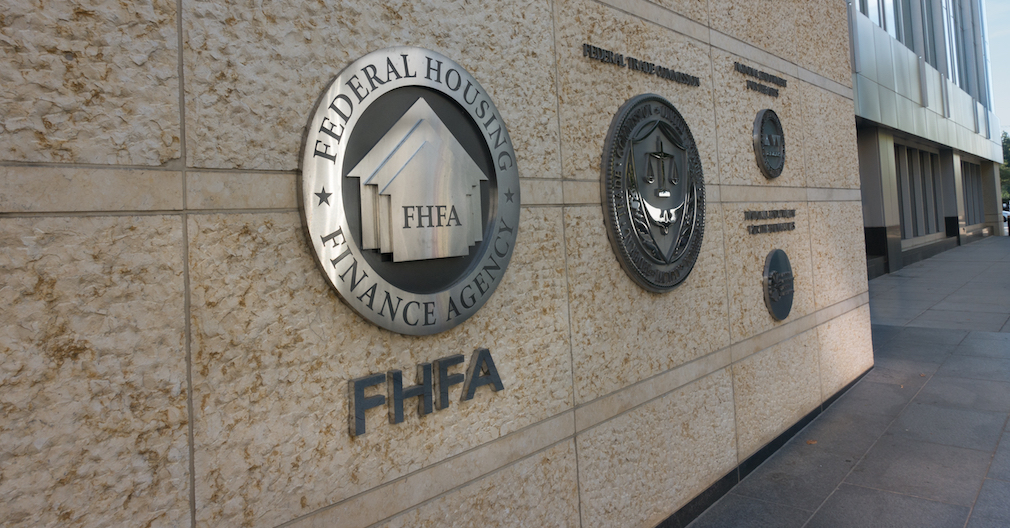After being confirmed by the Senate earlier this month, Mark Calabria officially took over Monday as the director of the Federal Housing Finance Agency, the federal agency charged with overseeing Fannie Mae, Freddie Mac, and much of the U.S. housing finance system.
Calabria was sworn in Monday as director of the FHFA, replacing Comptroller of the Currency Joseph Otting, who was picked by President Donald Trump to serve as acting director of the FHFA while Calabria awaited Senate confirmation.
Calabria received confirmation from the Senate two weeks ago, when the Senate voted to confirm him as FHFA director by a 52-44 margin. Now, Calabria, who previously served as Vice President Mike Pence’s chief economist, will take the reins at the FHFA.
Calabria has long been outspoken about housing finance throughout his career, including calling for the end of the conservatorship of Fannie Mae and Freddie Mac while serving as Pence’s chief economist.
And in remarks delivered at his swearing-in ceremony at the FHFA, Calabria emphasized the pressing need for housing finance reform.
“I enter this office with a great sense of urgency. One I hope you share,” Calabria said, according to his prepared remarks.
“The mortgage market was at the center of the last crisis, as it has been for many past financial crises, both in America and globally. I believe the foundations of our current mortgage finance system remain vulnerable,” Calabria continued. After years of strong house price growth, too many remain locked out of housing, while others are dangerously leveraged. We must not let this opportunity for reform pass.”
Calabria expressed his support for the recent call from Trump to end the conservatorship of Fannie and Freddie and reform the country’s housing finance system.
“The recently signed Presidential Memo lays out a constructive path for mortgage finance reform,” Calabria said. “I look forward to working with the Administration on this issue.”
Calabria brings a long career in and around housing finance to his role at the FHFA. Prior to joining Pence’s team, Calabria served at the Cato Institute and has long been an advocate for housing finance reform.
Earlier in his career, Calabria served as a senior aide on the Senate Banking Committee where he was one of the lead drafters of the Housing and Economic Recovery Act of 2008, which created the FHFA.
Calabria served as deputy assistant secretary for regulatory affairs at the Department of Housing and Urban Development during former President George W. Bush’s administration.
Calabria also held positions at Harvard’s Joint Center for Housing Studies, the National Association of Home Builders and the National Association of Realtors.
Then, in 2017, Calabria began serving as Pence’s chief economist.
Now, Calabria will be in position to chart the course of the future of housing finance.
“FHFA has made tremendous progress since its birth in 2008, a development I’ve continued to watch with great interest from the outside,” Calabria said. “It is my foremost objective to cement those gains. Lock in what you have accomplished. It is all too easy to watch regulatory improvements erode as the memory of the last crisis fades.”
Calabria also spoke of his first-hand experience dealing with people who were impacted by the housing crisis.
“This is not simply a matter of macroeconomics. While I am of course all too familiar with foreclosure numbers during the crisis, and the devastating losses in household wealth, I spent a considerable amount of my time as Banking Committee staff taking calls from families in financial distress,” Calabria said.
“These are real lives we impact, and while I am at heart a ‘numbers guy,’ we should never lose sight of the impact on families when mortgage finance goes wrong,” Calabria continued.
“Equally so, we should always take great pride in the impact of our work when mortgage finance goes right,” he added. “When that new homeowner starts to build equity, build a better future for themselves. That is what the American Dream is about.”
Calabria closed his speech by expressing optimism about the future of housing finance.
“I remain optimistic about America’s housing and mortgage market,” Calabria concluded. “But I remain so, because I know together all of us can build a stronger, more secure foundation under that market for all Americans.”






